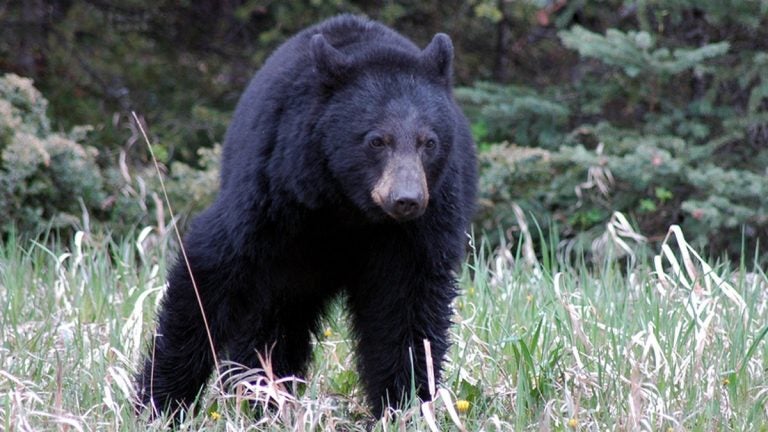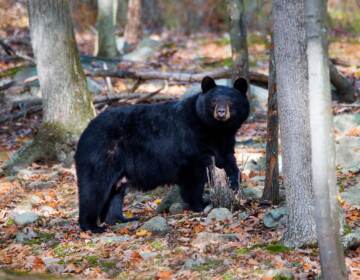New Jersey warns residents to be on the lookout for black bears this spring
While bears are more commonly seen in the northwest part of the state, bears have been sighted across all 21 counties.

The majority of New Jersey's black bears live in the northwest section of the state. (BigStock)
From Philly and the Pa. suburbs to South Jersey and Delaware, what would you like WHYY News to cover? Let us know!
The New Jersey Department of Environmental Protection wants residents to be aware of black bears emerging from hibernation this spring.
Since the 1980s, the black bear population in New Jersey has been growing. The animals tend to live in the state’s mixed hardwood forests, dense swamps and forested wetlands, but are highly adaptable.
While bears are more commonly seen in the northwest part of the state, bears have been sighted across all 21 counties. To reduce encounters and conflicts, the DEP is suggesting residents follow safety precautions:
- Secure trash and eliminate obvious food sources, such as pet food bowls, easy-to-reach bird feeders, or food residue on barbecue grills.
- Use certified bear-resistant garbage containers if possible. Otherwise, store all garbage in containers with tight-fitting lids and place them along the inside walls of your garage, in the basement, in a sturdy shed or another secure area.
- Wash garbage containers frequently with a disinfectant solution to remove odors. Put out garbage on collection day, not the night before.
- Avoid feeding birds when bears are active. If you choose to feed birds, do so during daylight hours only and bring feeders indoors at night. Suspend birdfeeders from a free-hanging wire, ensuring they are at least 10 ft. off the ground. Clean up spilled seeds and shells daily.
- Immediately remove all uneaten food and food bowls used by pets fed outdoors.
- Clean outdoor grills and utensils to remove food and grease residue. Store grills securely.
- Do not place meat, dairy or any sweet foods in compost piles.
- Remove fruit or nuts that fall from trees in your yard.
- Properly install electric fencing as an effective way to protect crops, beehives and livestock.
If a person encounters a bear during a hike or while camping, the best action is to remain calm and do not run from the animal, as it could trigger a predatory response.
- Here’s some more tips from the DEP:
- Avoid direct eye contact, which may be perceived by a bear as a challenge. Make sure the bear has an escape route.
- To scare the bear away, make loud noises by yelling, using a whistle, banging pots and pans, or blowing an air horn. Make yourself look as big as possible by waving your arms. If you are with someone else, stand close together with your arms raised above your head.
- Make bears aware of your presence by speaking in an assertive voice, singing, clapping your hands, or making other noises. If hiking through bear country, always make your presence known through loud talking or clapping your hands.
- If a bear utters a series of huffs, makes popping jaw sounds by snapping its jaws or swats the ground, these are warning signs that you are too close. Slowly back away and avoid direct eye contact. Do not run.
- If a bear stands on its hind legs or moves closer, it may be trying to get a better view or detect scents in the air. This is usually a non-threatening behavior.
- Black bears will sometimes “bluff charge” when cornered, threatened, or attempting to steal food. Stand your ground, avoid direct eye contact, slowly back away and do not run.
- If the bear does not leave, move to a secure area, such as a vehicle or a building.
- Families who live in areas frequented by black bears should have a “Bear Plan” in place for children, with an escape route and planned use of whistles and air horns.
- Black bear attacks are extremely rare. If a black bear does attack, fight back.
To reduce encounters, the state has provided $500,000 from the FY24 budget to provide bear-resistant trash receptacles to residents in areas impacted by bear-related nuisances.
To report black bear damage or aggressive bears locally, the DEP suggests people contact their local police department or the state’s Fish & Wildlife Department by calling 1-877-WARN DEP (1-877-927-6337).

Get daily updates from WHYY News!
WHYY is your source for fact-based, in-depth journalism and information. As a nonprofit organization, we rely on financial support from readers like you. Please give today.






